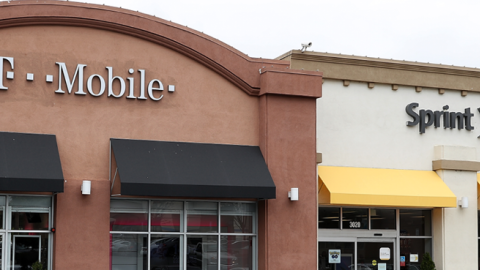Monday marks one year since T-Mobile US Inc. and Sprint Corp. announced their planned merger, and regulators at the Justice Department and Federal Communications Commission (FCC) are closing in on the final stages of their examination of its benefits.
During my tenure at the FCC, I reviewed many mergers to determine whether they were in the “public interest,” the legal standard the FCC must use when reviewing deals of regulated firms, like wireless companies. Today I’m advising T-Mobile on its deal and the evidence clearly demonstrates that the merger of the nation’s third- and fourth-biggest carriers by subscribers will strengthen competition against Verizon and AT&T, accelerate American build-out of the next generation of wireless service (or 5G), and boost the U.S. economy and our global competitiveness.
Regulators should approve it. There’s no time to lose.
Today, Verizon and AT&T have nearly 70 percent market share and 93 percent of the industry cash flow. Combining T-Mobile and Sprint will create a supercharged maverick, which will still be only Number Three. This newly invigorated third carrier will be better able to compete against the larger two.
The combination will create more than $43 billion in cost savings through 2024 by combining networks, cell sites and overlapping advertising and marketing costs. These savings will allow the New T-Mobile to raise about $40 billion to build its new 5G network and services.
T-Mobile and Sprint standing alone do not have the nationwide reach or financial strength to fully compete against AT&T and Verizon. If the deal’s opponents have their way, the two companies’ 5G buildout will be far more modest and slower than if the deal is approved. The merger’s opponents are essentially arguing for an industrial policy that discourages competition against the top two.
Moreover, approval of the merger will help deliver America’s 5G future faster. Europe, Asia and the U.S. are in a fierce global race to dominate the 5G market, and the outcome is uncertain. Other countries are still chapped that the U.S. beat them to the 4G finish line.
By 2014, 4G added almost $100 billion annually to American economic output and created millions of wireless related jobs. It also powered the app economy because tools like Uber, Waze and Netflix could not work without superfast mobile speeds. Nearly three quarters of the companies in the global app economy are American, according to advocacy group CTIA.
Our rivals are trying hard to knock America off of her perch, displace cradles of innovation like Silicon Valley, and reap tremendous economic rewards as the 5G economy unfolds. Since 2015, China has built about 350,000 cell sites, compared with 30,000 in the U.S., according to Deloitte. That’s a huge competitive disparity.
Plus, China United and China Telecom may soon merge to create a massive 5G juggernaut. And Japan promises to make the 2020 Tokyo Olympics a showcase for its 5G prowess.
Approving the T-Mobile-Sprint merger will allow the New T-Mobile to invest more money in 5G faster and that will trigger a competitive response from Verizon and AT&T to spend sooner as well. As a result, America will quite literally build its 5G infrastructure faster and more robustly than if the deal is rejected. The deal’s opponents want America to remain complacent.
Furthermore, by 2024, the New T-Mobile will have three times more 5G capacity than what the two companies would have standing alone. Simple economics tell us that wireless prices will go down, not up, because of the vast amount of new supply and capacity created by 5G.
And after spending nearly $40 billion on a new 5G network and services, the New T-Mobile will have no choice but to aggressively compete on price and quality to attract enough customers to pay for its new facilities and fill up its added capacity. If the New T-Mobile were to raise prices, consumers would flee to the other carriers, which creates a strong disincentive to raise prices to begin with.
Lastly, the merger will create jobs, not destroy them. All told, the combined company’s nearly $40 billion investment in 5G infrastructure and services is predicted to create and sustain new jobs for more than 33,000 people between 2019 and 2023.
Don’t believe this prediction? Take a look at T-Mobile’s history of job creation from its acquisition of MetroPCS six years ago. The same naysayers forecast a loss of 10,000 jobs, yet T-Mobile tripled the number of Metro employees – creating a net 12,000 new jobs.
This merger will create a super-charged maverick that will propel America to our 5G future faster. If regulators allow these disruptors to unite, investment, innovation and jobs will surge, and America will win the global race to 5G.



















